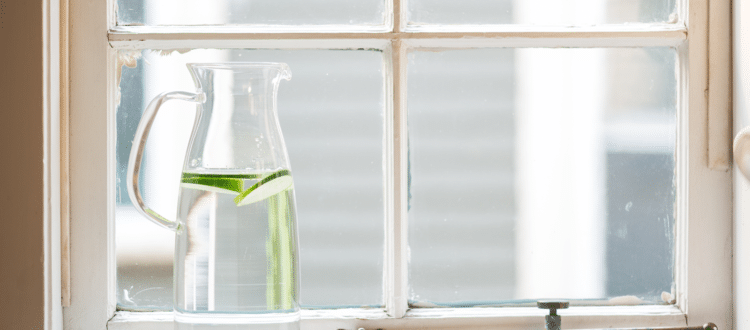
How much water should you drink?
Aug 4, 2017
The fluids you drink can add or subtract from your health.
How much water you should drink per day requires an individual answer for your unique self. But, there are rules of thumb…
The Institute of Medicine (IOM) recommends a total water intake of 125 oz. (15.6 cups) for men and 91 oz. (11.4 cups) for women. Because it is estimated that 20% of your fluid intake is achieved through foods, the total water that is needed from fluids alone is about 104 oz. (13 cups) for men and 72 oz. (9 cups) for women. Another way to calculate is to take in half your body weight in ounces per day. If you weigh 150 lbs, for example, you’d aim for 75 oz (half of 150) of water per day from food and beverages.
Your daily fluid intake (not just water) also depends on exercise level, respiration rate, environmental conditions, illness, health/ fitness status, and pregnancy or breastfeeding status. Half your body weight may seem too much for some (and pee out your minerals), but may not be enough for others. It is a place to start and see how you feel; tune in to your body.
When you should drink
Since you experience thirst long enough before dehydration, the best measurement of how much water you need to drink is being aware of your body’s signal of true thirst. Take care not to confuse thirst for hunger – if you feel an urge for something, drink water first to see if that fulfills your need. Learn to differentiate your body’s requests. Until you have perfected tuning in to your body, use the above quantities as general guidelines.
The majority of drinking should be done between, not along with, meals so that digestive acid and enzymes are not too diluted. Warm or cold is a matter of personal preference.
What to drink
When considering your drink choices avoid soda (with 3-4 tablespoons of sugar per can – a full day’s recommendation of sugar), caffeinated coffee or tea (a stimulant), and juice (again, more sugar).
That leaves herbal teas and water. Herbal teas often are sources of bioavailable minerals. Consumed hot or cold, teas can provide nutrition, physiological support, and variety in your drinking pleasure. Organic tea is preferable, to minimize exposure to pesticides.
Where to get the “cleanest” water is a tricky decision, and when aware of all the ramifications of our choices, could be why most of us don’t drink enough water. There’s often a trade-off between hydration, what’s best for the planet, and unwittingly ingesting toxins.
- Bottled water, often more unregulated than tap water, uses several times its volume in production, not to mention the impact of non-recycled plastic bottles.
- Reverse osmosis water is probably the purest of the drinking waters, but isn’t “clean”, as it creates 3-20 gallons of wastewater to produce one gallon of drinking water.
- Distilled or deionized water are free of impurities and potential toxins but is also void of any dissolved minerals, and essentially “dead” water.
- Tap water (in a stainless steel, ceramic, or glass container) may be the best solution, as long as it’s filtered.
A lot of liquid for thought
Our body is 60% water, and without it we get tired and lose energy. We look as tired as we feel because our skin isn’t plump with hydration, and we get sick because our blood and vital organs can’t flush away the waste. Social activism and awareness of environmental toxins aside, replenishing our body’s daily water usage is tantamount to good health, so do your best to DRINK UP!
Water resources
- How much to drink: Mayo Clinic and Institute of Medicine
- Water filtration options: Environmental Working Group Buying Guide
- How much water goes into making a bottle of water?
